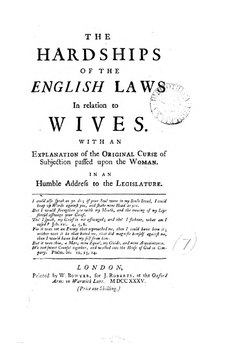Index:The Hardships of the English Laws in Relation to Wives. Bodleian copy.pdf
| Formatting guidelines specific to this work may have already been established. Please check this Index's discussion page and follow any such conventions. |
|  THE CONTENTS.
The Seasonableness of speaking ours, Deism increasing. p. 2. The Law: complained of gratify Pride, plead Prescription, but are not reasonable or just. p. 5. The Proof of it, 1. By Facts; Mrs Lewis's Case. 2. More Cases. Mrs. Veezey’s; another Gentleman's. p. 5—9. 2. By observations upon them. p. 10, 11. 3. The Case of Heiresses, Disposal of Fines p. 14. 4. The Case of Adultery. p. 15. Women debarred from educating their own Children when they have no other Parent left, Exemplified. p. 17. Objection, the Husband best judge whether the Mother is fit to educate the Children. Answer, Women, not naturally unfit for it; not accidentally disqualified; the Fault of the other sex, in the Education they give Women, or the Laws they make for them, p. 20. 21. 5. The Husand's Commands supersede all Authority whatever; this no Privilege to Wives ibid. 6. The Civil and English Law, compared in some Instances. p. 27. 1. By the Civil Law the Wife inherited the whole Estate, when the Husband died without Issue; by the English Law, not a third Part of it. ibid. 2. By the Civil Law, a Woman allowed her Paraphernalia; by the English Law, not allowed it. ibid. 3. The Property of the Portion remained with the Wife; by the English Law not. p. 29. By the Laws of Portugal the Wife may dispose of half her Husband's Estate by Will; by the English Law, no Part of his Estate, or her own either. ibid. Objection, I. A Woman may swear the Peace against her Husband Cruelty Answer, This Remedy not always to he had; Hardship: arising from it. p. 30. Objection, II. The Wife may put her Fortune in Trustees Hands before Marriage. Answer, Few Women know this; if it were done, how little it would avail. p. 32. Objection, III. Jointures out of the Husband's Power to alienate. Answer, they are not sufficient for all Occasions. Case of a young Lady, Reflections upon it. ibid. Objection IV. The Law obliging Men to pay their Wives Debts contracted before Mariage as hard upon them. Answer, No; a Woman's Circumstances are more easily known than a Man's. Some Ways by which Men may deceive Women instanced. p. 33. Objection V. There are Tricks and Cheats, and no Part of the Law. Answer, the Law exposes Women to them, in that it gives no Redress to them, when so cheated. p. 36. Objection VI. Amends made for all this, by Wives Exemption from Imprisonment in Civil Causes. Answer, That Exemption the Consequence of their having no Property; that Exemption, not out of Favour to them, but to their Husbands, to secure their Chastity. p. 40. Objection VII. The Law justified, if that Exemption is a Recompence to Wives, what Motive soever it proceeded upon in decreeing such Exemption. Answer, That it is not a Recompence, illustrated by a Parallel Case. p. 41. Objection VIII. Marriage a voluntary Act. Answer, Not always, considering the Influence of Parents and Guardians and also the Education of Women. p. 42. Objection IX. England the Paradise of Women. Answer, England also the Paradise of Men: Both Sexes have a Right to Justice from their Governors, notwithstanding that Observation. p. 45. Objection X. These are all rare Cases, for the Generality Wives have no Reason to complain. Answer, True: But no Thanks to the Laws of our Country. p. 46. An Address 1. To the Legislature. p. 49. 2. To unmarried Women. p.52. After all; Women not worth any Regard. Answer, some have thought otherwise; the Sexes equal till the Fall, hence the Disparity. p. 53. The Original Curse explained, and accounted for. p. 61. But the English Law goes far beyond it. p. 67. |
